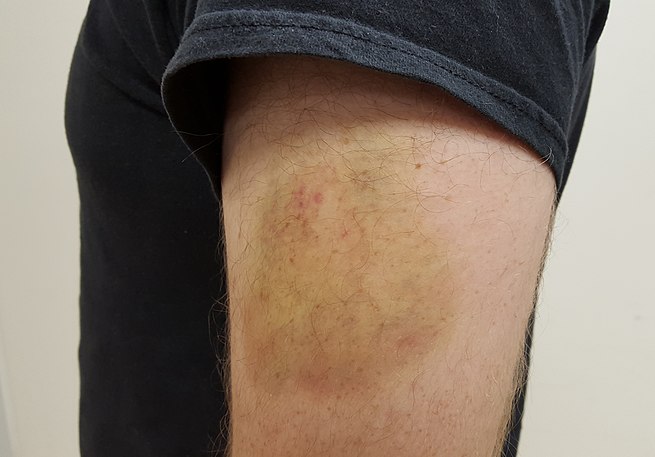Main Difference
The main difference between Hematoma and Contusion is that the Hematoma is a localized collection of blood outside the blood vessels and Contusion is a type of hematoma.
-
Hematoma
A hematoma (US spelling) or haematoma (UK spelling) is a localized collection of blood outside the blood vessels, due to either disease or trauma including injury or surgery and may involve blood continuing to seep from broken capillaries. A hematoma is initially in liquid form spread among the tissues including in sacs between tissues where it may coagulate and solidify before blood is reabsorbed into blood vessels. An ecchymosis is a hematoma of the skin larger than 10mm.
They may occur among/within many areas such as skin and other organs, connective tissues, bone, joints and muscle.
A collection of blood (or even a hemorrhage) may be aggravated by anticoagulant medication (blood thinner). Blood seepage and collection of blood may occur if heparin is given via an intramuscular route; to avoid this, heparin must be given intravenously or subcutaneously.
It is not to be confused with hemangioma, which is an abnormal buildup/growth of blood vessels in the skin or internal organs.
-
Contusion
A contusion, commonly known as a bruise, is a type of hematoma of tissue in which capillaries and sometimes venules are damaged by trauma, allowing blood to seep, hemorrhage, or extravasate into the surrounding interstitial tissues. The bruise then remains visible until the blood is either absorbed by tissues or cleared by immune system action. Bruises, which do not blanch under pressure, can involve capillaries at the level of skin, subcutaneous tissue, muscle, or bone. Bruises are not to be confused with other similar-looking lesions primarily distinguished by their diameter or causation. These lesions include petechia (1 cm caused by blood dissecting through tissue planes and settled in an area remote from the site of trauma or pathology such as periorbital ecchymosis, e.g.,”raccoon eyes”, arising from a basilar skull fracture or from a neuroblastoma).
As a type of hematoma, a bruise is always caused by internal bleeding into the interstitial tissues which does not break through the skin, usually initiated by blunt trauma, which causes damage through physical compression and deceleration forces. Trauma sufficient to cause bruising can occur from a wide variety of situations including accidents, falls, and surgeries. Disease states such as insufficient or malfunctioning platelets, other coagulation deficiencies, or vascular disorders, such as venous blockage associated with severe allergies can lead to the formation of purpura which is not to be confused with trauma-related bruising/contusion. If the trauma is sufficient to break the skin and allow blood to escape the interstitial tissues, the injury is not a bruise but instead a different variety of hemorrhage called bleeding. However, such injuries may be accompanied by bruising elsewhere.
Bruises often induce pain, but small bruises are not normally dangerous alone. Sometimes bruises can be serious, leading to other more life-threatening forms of hematoma, such as when associated with serious injuries, including fractures and more severe internal bleeding. The likelihood and severity of bruising depends on many factors, including type and healthiness of affected tissues. Minor bruises may be easily recognized in people with light skin color by characteristic blue or purple appearance (idiomatically described as “black and blue”) in the days following the injury.
-
Hematoma (noun)
A swelling of blood, usually clotted, which forms as a result of broken blood vessels.
-
Contusion (noun)
A wound, such as a bruise, in which the skin is not broken, often having broken blood vessels and discolouration.
-
Contusion (noun)
The act of bruising.
-
Contusion (noun)
a region of injured tissue or skin in which blood capillaries have been ruptured; a bruise
“vigorously shaking the head back and forth can produce contusions to the soft structure of the brain”
“a dark contusion on his cheek was beginning to swell”

